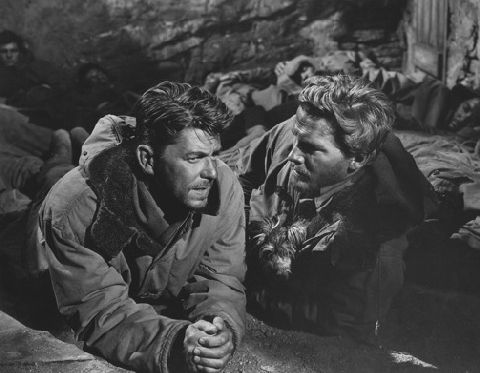Prisoner of War (1954) 
“THE NAKED TRUTH ABOUT LIFE IN THE P.O.W. CAMPS!”

Director: Andrew Marton
Cast: Ronald Reagan, Steve Forrest, Dewey Martin
Synopsis: An American army officer, troubled by reports of brutality, volunteers to investigate conditions inside North Korean POW camps.
Prisoner of War is an example of how Hollywood was — and still is — capable of completely misunderstanding the gravity and importance of the subject matter it was handling. Although the movie was reportedly based on actual testimony of soldiers forced to endure brutal torture at the hands of their captors during the Korean War, Prisoner of War sidesteps most of the controversial subject matter in order to deliver a run of the mill anti-Communist propaganda piece that fails to shock, move, or even particularly interest its audience.
Ronald Reagan, whose movie career was already winding down by 1954, plays Webb Sloane, an army officer instructed to parachute into enemy territory in order to infiltrate a POW camp, report back on the conditions he finds there and provide evidence of atrocities committed against American soldiers. Quite how he’s supposed to provide this evidence is never explained — all he can do is tell what he saw, the same as all the other prisoners incarcerated in the camps. Anyway, with laughable ease, Sloane sneaks amongst a group of soldiers being force-marched to a camp, where he finds that the Korean commander is under the tutelage of a Russian Colonel, Nikita I. Biroshilov (Oscar Homolka – Billion Dollar Brain, Assignment to Kill).
Biroshilov initially comes across as an avuncular type, but that’s all a dastardly front designed to throw the prisoners off-guard. He recommends the Korean colonel (Leonard Strong) instruct the men to write down details of their life back home: where they worked, how much they earned, what family they have waiting for them, etc. Biroshilov then sifts through all these essays to filter out those he believes are suitable candidates for indoctrination into the Communist ideology. One such candidate is Jesse Treadman (Dewey Martin – The Thing from Another World), a young soldier whose essay reveals that he was sent to fight in Korea despite the army’s promise to keep him stationed close to his mother. It’s not long before Treadman is sharing tea and cake with Biroshilov in the Russian commander’s office, and one small step from there to becoming the enemy’s lackey.
Meanwhile Sloane becomes friends with Corporal Joseph Stanton (Steve Forrest – Rogue Cop, Heller in Pink Tights), a model soldier who refuses to bend to his captor’s will. When the Koreans sit him in front of a bright light and question the stability of the capitalist pigs’ way of life, Stanton cracks jokes about Clark Gable and Spencer Tracy — that’s how tough he is. Stanton thinks Sloane is a good egg, too — until, that is, Sloane’s mission requires him to pretend to become a convert to Communism in order to get closer to Biroshilov.
Although Prisoner of War has a few scenes of torture, they’re pretty tame by today’s standards. The most potent is one in which an American airman has his arms hooked behind him over a horizontal pole and weighed down by a heavy boulder tied to his wrists. He then has freezing cold water thrown over his face until he acquires a strange beard of icicles. Some of the men are forced to lie in shallow trenches for days at a time, and others are hung by their arms, but that’s about it, really. This is why Prisoner of War fails so abjectly in its mission to bring the very real atrocities performed by Korean soldiers on their American counterparts to the attention of the American public. It was probably only the scene in which a pet dog was put in a sack and battered to death that any outraged passion was inflamed in the audience.
Prisoner of War was one of Reagan’s favourite of his own movies, largely because it hastened his conversion from Democrat to Republican, but it contains too many absurdities to warrant serious consideration as anything other than a wartime potboiler. The Russians and Koreans are all depicted as sneering bad guys whose sole purpose in life is to inflict physical and psychological pain on their prisoners, while the storyline simply rehashes plot points from other movies before entering the realm of the ridiculous when one of the prisoners abducts a high-ranking officer and murders him.
(Reviewed 5th February 2014)
